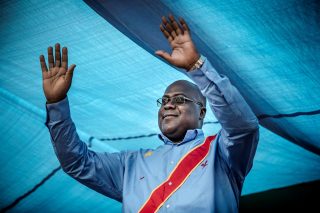The Belgian king and queen recently concluded a trip to the Democratic Republic of Congo (DRC) – a former Belgian colony – by visiting Congolese gynaecologist Denis Mukwege. A Nobel Peace Prize laureate and one of the world’s foremost experts on wartime sexual violence, Mukwege labelled the royal visit a “strong humanitarian act” which displayed “exceptional courage”, coming it as it did amidst rising violence in the east of the country.
During the week-long sojourn, Belgium’s King Philippe expressed his deepest regrets for the “abuse and humiliation” that the Congolese people suffered during the reign of his 19th-century antecedent Leopold II. That conciliatory language built upon a similarly phrased letter sent to the DRC’s President Félix Tshisekedi two years ago has sparked hopes that the two nations can build a renewed partnership for the 21st century. Indeed, the royal visit focused mostly on the future, with Belgium pledging to help the DRC fight issues including climate change, poverty and insurgent instability.
Building bridges
The visit was King Philippe’s first since taking the throne in 2013 and had originally been planned to coincide with the 60th anniversary of the DRC’s independence two years ago but was forestalled by the coronavirus pandemic. Nonetheless, the Belgian monarch sent a heartfelt missive at the time expressing regret for the Congo Free State period between 1885 and 1908. “To further strengthen our ties and develop an even more fruitful friendship”, the king told Tshisekedi, “we must be able to talk about our long common history in all truth and serenity”.
Although he stopped short of a full apology for Belgium’s colonial administration of the DRC, King Philippe’s letter and more recent speech have been interpreted as a major turning point in relations between the two countries. In addition to his words of contrition, the Belgian king—who, like Tshisekedi, was born after the DRC achieved independence in 1960—also returned a ceremonial mask that is used by the Suku ethnic group in their initiation rites. “I am here to return to you this exceptional work in order to allow Congolese to discover and admire it,” King Philippe told Félix Tshisekedi as he offered the mask previously held by Belgium’s Royal Museum for Central Africa. “It marks a symbolic beginning of the reinforcement of the cultural collaboration between Belgium and Congo”. The gesture is just the first of a massive cache of artworks and artefacts that are scheduled to be restored to the Congolese people, with the first returns planned for later this year.
“A new partnership”
During the visit, Belgium also offered concrete commitments and evinced a willingness to help the DRC overcome some of its biggest challenges. Brussels pledged to invest €16 million towards improving working conditions and social protection protocols in the DRC, which is currently in 175th place (out of 189 nations) in the UN’s Human Development Index.
That money is expected to target job creation in the informal economy, where women and young people are particularly disadvantaged, with up to 12,000 “quality” employment opportunities in the pipeline. Belgium and the DRC have also agreed to work together to improve dialogues between employer and employee, fortifying the rights of the latter without compromising the interests of the former.
Aside from these humanitarian issues, collaboration in the fight against climate change and the overexploitation of natural resources was on full display during the royal visit. King Philippe and Queen Mathilde visited the massive Miombo forest, where they observed a forestry project the DRC Ministry of Environment is working on with the UN Food and Agriculture Organization (FAO). Since February 2021, twenty local communities have received concessions of more than 200,000 hectares of forest each, pledging to manage the allotments sustainably and receiving training in how to plant native species and useful.
“These local forest concessions will contribute to improving the social, economic and ecological environment of local communities and indigenous peoples and will transform the potential of their forests into visible wealth”, one FAO representative explained. The programme’s successes have paved the way for the broader efforts against deforestation, one of Tshisekedi’s policy priorities, and King Philippe was full of praise for the initiative to balance community livelihoods with preserving the vital forest ecosystem. Congo’s rainforest, the Belgian king underlined, is an “ecological resource” essential to the fight against climate change, and Belgium is already involved in the DRC’s environmental programme in the forest of Yangambi.
Eastern conflict in the spotlight
The Belgian delegation also offered their support for the DRC in their fight against militias, allegedly backed by Rwanda. Fighting has increased sharply over the past few months, to the point where Kenya has called for the East African Regional Force, under the auspices of the East African Community which the DRC joined in March of this year, to intervene. “You have the right to demand from your neighbours that your territory be respected”, Belgian Prime Minister Alexander De Croo underlined in Kinshasa, while King Philippe emphasized that “you can count on Belgium’s support, within international bodies, for any initiative aimed at the stability and harmonious development of Africa’s Great Lakes region”.
As the conflict continues to escalate, with rebels recently seizing the key trading hub of Bunagana, on the Ugandan border, Belgium’s help will be increasingly vital. King Philippe and the international community, the DRC declared shortly after the royal visit concluded, have an important role to play in setting up a regional dialogue which could lead to “the easing of tensions and the peaceful resolution of the conflict”.
Indeed, following the success of the royal visit, Kinshasa is hoping that Brussels will advocate for Congolese interests on a global stage. “When Belgium talks about Congo in the U.N.”, one senior diplomat explained, “everyone is listening”. The closer partnership will benefit both sides: by collaborating together on modern-day issues such as global warming, social inequality and regional stability, the two nations can focus on fostering a solid friendship for the future.








